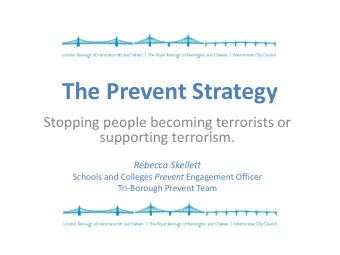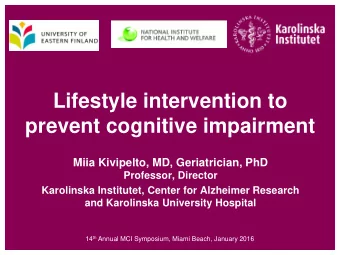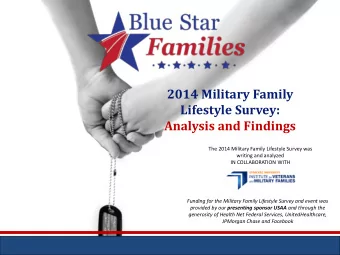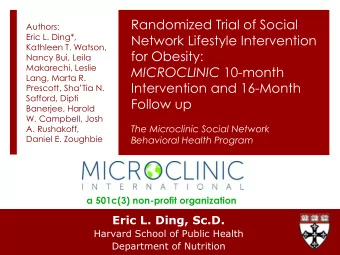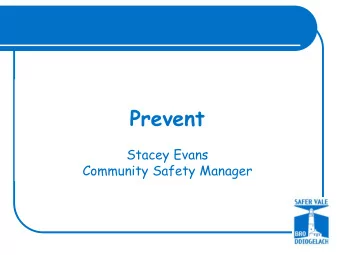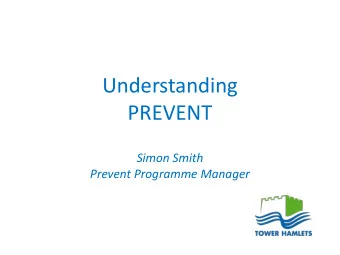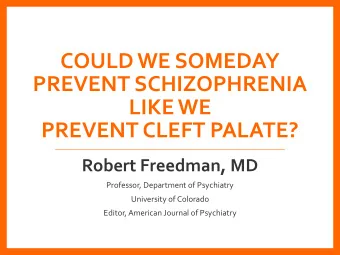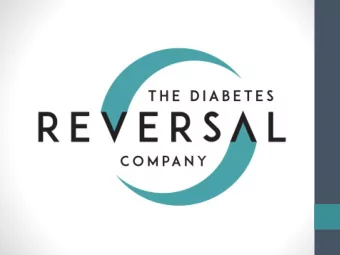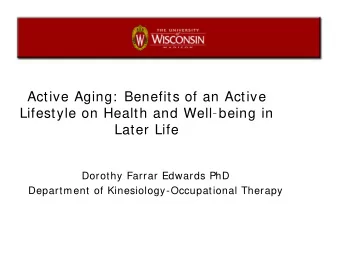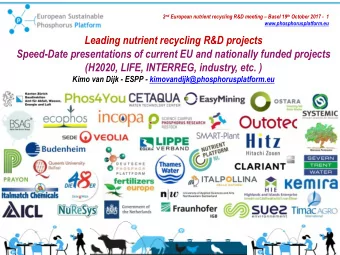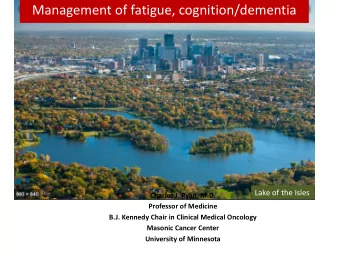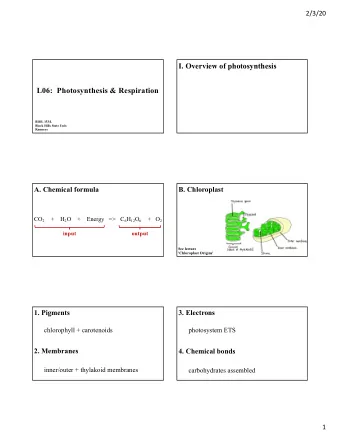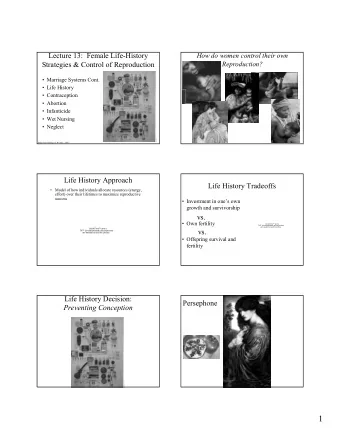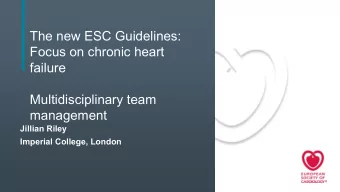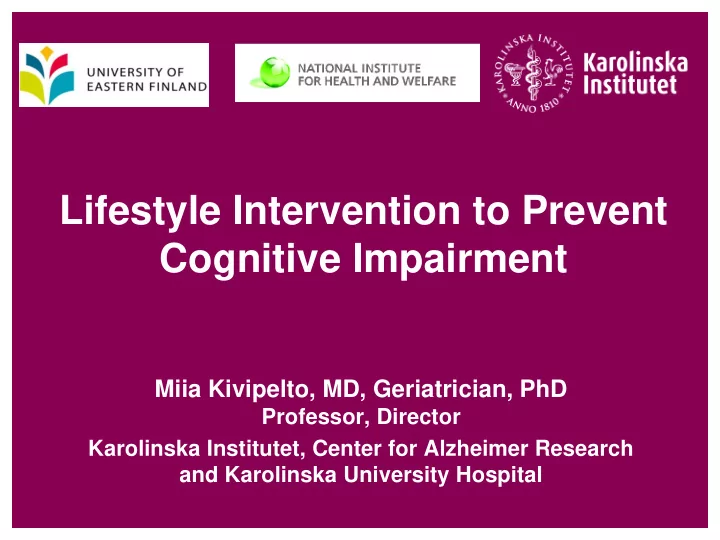
Lifestyle Intervention to Prevent Cognitive Impairment Miia - PowerPoint PPT Presentation
Lifestyle Intervention to Prevent Cognitive Impairment Miia Kivipelto, MD, Geriatrician, PhD Professor, Director Karolinska Institutet, Center for Alzheimer Research and Karolinska University Hospital Are there ways to prevent cognitive
Lifestyle Intervention to Prevent Cognitive Impairment Miia Kivipelto, MD, Geriatrician, PhD Professor, Director Karolinska Institutet, Center for Alzheimer Research and Karolinska University Hospital
Are there ways to prevent cognitive impairment and dementia/AD? State of the art Finnish Geriatric Intervention Study to Prevent Cognitive Impairment and Disability Future directions: Multi-domain, multinational studies and pragmatic prevention programs
Dementia and Alzheimer disease: importance of life-long exposure to multiple factors RISK FACTORS MECHANISMS Unhealthy diet, Alcohol misuse, Neuronal Smoking, Diabetes, Depression damage APOE , Vascular High blood pressure other genes insults Obesity High blood cholesterol Familial aggregation Late-life Adult life Mid-life DEMENTIA 20 0 60 75 Transition Education Brain reserve Physical activity, Cognitive reserve Cognitive & social activity PROTECTIVE FACTORS MECHANISMS Kivipelto, Mangialasche et al., Oxford Ger Text Medicine 2015, in press
To what extent can Alzheimer dementia be prevented? Risk factor PAR Diabetes mellitus 2.9% Midlife hypertension 5.1% Midlife obesity 2.0% Physical inactivity 12.7% Depression 7.9% Smoking 13.9% Low education 19.1% Combined PAR* 28.2% PAR=population-attributable risk. *Adjusting for non-independence of the risk factors. Norton et al., Lancet Neurol, 2014; Kivipelto and Mangialasche, Nature Neurol Rev, 2014
Randomized controlled trials
Finnish Geriatric Intervention Study to Prevent Cognitive Impairment and Disability
• Proof-of-concept trial - multidomain approach to cognitive decline prevention • At-risk segment of the general elderly population (not patients) • 2-year multi-domain lifestyle intervention: Nutritional guidance Physical activity Cognitive training and social activities Monitoring of metabolic and vascular risk factors: hypertension, dyslipidemia, obesity, impaired glucose tolerance Clinicaltrials.gov NCT01041989 Protocol in Kivipelto, Solomon et al., Alzheimer & Dementia 2013
Principal Investigator: FINLAND Prof. Miia Kivipelto Participants: - Previous national surveys (FINRISK) - N=1260 Oulu - Age 60-77y cohort - Randomized into 2 groups (1:1) Kuopio Time schedule: cohort - Intervention completed Seinäjoki February 2014 cohort - Extended 5-year follow-up starts April 2015 Turku - Extended 7-year follow-up cohort planned Vantaa Helsinki cohort cohort
INCLUSION CRITERIA: persons at risk of dementia/cognitive decline Dementia Risk score > 6 points Based on risk factors assessed in earlier population surveys: Age, Education, Sex, SBP, Cholesterol, BMI, Physical Activity (Kivipelto et al., Lancet Neurology 2006) AND Cognitive performance at mean level or slightly lower than expected for age (based on CERAD test battery) Protocol in Kivipelto et al., Alzheimer & Dementia 2013
INTERVENTION SCHEDULE INTENSIVE MULTIDOMAIN INTERVENTION NUTRITION: 7 group sessions, 3 individual sessions EXERCISE: EXERCISE: EXERCISE: 1-2x/wk muscle 2x/wk muscle 2x/wk muscle strength training INTERVENTION KICK-OFF 2-4x/wk aerobic 4-5x/vk aerobic 5-6x/wk aerobic training COGNITIVE TRAINING: COGNITIVE TRAINING: RANDOMIZATION 2nd Baseline visit 1st Baseline visít 9 group sessions 2 group sessios Independent training Independent training Screening MONITORING AND MANAGEMENT OF METABOLIC AND VASCULAR RISK FACTORS Nurse: Visit every 3 months, Physician: 3 additional visits months 3 6 9 12 15 18 21 24 MINI- INTERVENTION REGULAR HEALTH ADVICE Kivipelto et al., Alzheimer & Dementia 2013
FINGER intervention
OUTCOMES Primary: Neuropsychological Test Battery (NTB) total z score (cognitive change) Secondary: Dementia/AD (after 7 years) Depressive symptoms (Zung scale) Vascular risk factors, morbidity and mortality Disability (questionnaire, ADL + IADL) Quality of life (RAND-36, 15D) Utilization of health resources Blood markers (i.e. inflammation, redox status, lipid and glucose metabolism, telomere length) Brain MRI measures (n=200) and PET (n=60) Kivipelto et al., Alzheimer & Dementia 2013
Results Primary efficacy outcome: global cognition (NTB composite Z score) Intervention group: 25% higher improvement Difference between intervention and control groups per year: Estimate (95% CI) = 0.022 (0.002-0.042) p=0.03 Lines = estimates for cognitive change from baseline to 12 and 24 months Higher scores = better performance Error bars = standard errors P-values = difference in trajectories over time between groups Kivipelto, Ngandu, Mangialasche et al., Lancet 2015
Results Intervention effects on various cognitive domains (secondary outcomes) Memory (abbreviated score) Executive functioning Processing speed 0.14 0.14 0.12 0.12 0.10 0.10 0.08 0.08 0.06 0.06 0.04 0.04 0.02 0.02 0.00 0.00 Baseline 12 months 24 months Baseline 12 months 24 months Control Intervention Control Intervention 40% higher improvement 150% higher improvement 83% higher improvement Difference between intervention and control groups per year: Estimate (95% CI), p-value 0.027 (0.001-0.052) 0.030 (0.003-0.057) 0.038 (0.002-0.073) p=0.04 p=0.03 p=0.04 Kivipelto et al., Lancet 2015
Risk for cognitive decline NTB total score 1.8 * 1.6 1.4 1.2 1 0.8 0.6 0.4 0.2 0 * p<0.05 Intervention Control Kivipelto, Ngandu, Mangialasche et al., Lancet 2015
Intervention effects on secondary outcomes Difference between intervention Control Intervention and control groups per year Mean change Mean change (SE) (SE) Estimate (95% CI) P value Vascular factors Body mass index (kg/m2) -0·33 (0·05) -0·49 (0·05) -0·077 (-0·149 - -0·006) 0·02 Lifestyle factors ** Fish intake at least twice/week (%) +0·8 +11·0 10·2 <0·001 Daily intake of vegetables (%) -1·0 +2·9 3·9 0·023 Physical activity ≥2 times/week (%) -2·1 +7·0 9·1 <0·001 Mixed-model repeated-measures analyses ** Multinominal logistic regression (change in % units between baseline and 24 months) Kivipelto et al, Lancet 2015
Prevention of dementia: Future? Necessary of multi-national studies and pragmatic prevention programs
European Dementia Prevention Initiative www.edpi.org • FINGER Finnish Geriatric Intervention Study to Prevent Cognitive Impairment and Disability • Pre-DIVA Prevention of Dementia by Intensive Vascular Care • MAPT Multidomain Alzheimer Preventive Trial Data pooling and joint analyses > 6000 participants IUNS 2013 15/01/2016 18
Pilot Studies on Preventive Strategies related to Neurodegenerative Diseases Multimodal preventive trials for Alzheimer’s Disease: towards multinational strategies (MIND-AD)
Ongoing clinical trials in Alzheimer disease (AD) β amyloid Tau Aß production Cholinergics Aß aggregation Others Aß clearance † Currently approved for AD treatment Mangialasche , Kivipelto et al, modified 2013 from Lancet Neurology, 2010
Take home points: how to prevent dementia 1. Timing: starting early, at-risk persons 2. Multi-factorial aetiology – multi-domain interventions effective for several cognitive domains 3. FINGER: a pragmatic model that can be tested and adapted in various settings and populations 4. Future: Multi-national prevention RCTs & Pragmatic prevention programs, integrated interventions
Acknowledgements Grant support: Swedish Research Council, ALF grants, Academy of Finland, Novo Nordisk Foundation, Alzheimer’s Research and Prevention Foundation, Alzheimer Association, EU 7 th framework, AXA Research Foundation, CIMED, JPND, Innovative Medicines Initiative, EiT-Health Francesca Mangialasche Unit for Clinical Trials Shireen Sindi Hilkka Soininen Anna Sandebring Alina Solomon Angel Cedazo-Minguez Tuomo Hänninen Erik Westman Minna Rusanen Gabriela Spulberg Juha Rinne Lars Bäckman Anders Wimo Babak Hooshmand Karin Wallin Krister Håkanson Göran Hagman Tiia Ngandu Ulrika Akenine Jenni Lehtisalo Stefan Borg Tiina Laatikainen Susanna Cronfalk Markku Peltonen Laura Fratiglioni Esko Levälahti Agneta Nordberg All FINGER study teams Bengt Winblad
Life matters! Miia Kivipelto ICAD 2010 15.1.2016 23
Recommend
More recommend
Explore More Topics
Stay informed with curated content and fresh updates.
